
SPIXIANA
Scope & Guideline
Exploring the Wonders of Zoology
Introduction
Aims and Scopes
- Biodiversity Assessment:
The journal emphasizes the documentation and assessment of biodiversity across various taxa, including amphibians, reptiles, fish, and invertebrates, contributing to the understanding of species distribution and ecological dynamics. - Taxonomic Research:
SPIXIANA showcases rigorous taxonomic studies that include the description of new species, revisions of existing classifications, and molecular phylogenetic analyses, thereby advancing the field of systematic biology. - Ecological and Behavioral Studies:
Research on the ecology and behavior of species is a core focus, with studies often exploring interactions within ecosystems, adaptations to environmental changes, and implications for conservation. - Conservation Biology:
The journal also addresses conservation issues, highlighting rare and endangered species, their habitats, and the effects of human activities on biodiversity, thus aiming to inform conservation strategies and policy. - Geographic Distribution:
Studies documenting geographic distributions of taxa contribute to understanding biogeography and the effects of climate change and habitat alteration on species ranges.
Trending and Emerging
- Molecular Phylogenetics:
There is an increasing trend toward molecular phylogenetic studies, which utilize genetic data to resolve species relationships and clarify taxonomic classifications, providing deeper insights into evolutionary processes. - Conservation Genetics:
Research focusing on the genetics of endangered species is gaining momentum, emphasizing the importance of genetic diversity for conservation efforts and the management of small populations. - Impact of Climate Change:
Studies investigating the effects of climate change on biodiversity and species distributions are on the rise, reflecting growing concerns about environmental changes and their implications for conservation. - Invasive Species Research:
There is a notable increase in research addressing invasive species and their ecological impacts, as well as studies on management practices to mitigate their effects on native biodiversity. - Ecological Interactions and Behavior:
Emerging themes include detailed studies of ecological interactions, such as predator-prey dynamics and mutualistic relationships, providing valuable insights into ecosystem functioning.
Declining or Waning
- Traditional Morphological Studies:
There is a noticeable decline in traditional morphological studies as researchers increasingly favor molecular techniques for species identification and phylogenetic analysis. - General Faunistic Surveys:
General surveys of fauna without specific ecological or conservation implications are becoming less frequent, as the journal shifts towards studies with more focused ecological insights or conservation relevance. - Studies on Common Species:
Research focusing on common or widely distributed species is diminishing, with a growing trend towards documenting rare, endemic, or threatened species, reflecting a shift in conservation priorities. - Historical Taxonomic Reviews:
While historical reviews have been a staple in taxonomy, there is a reduction in these publications as the journal emphasizes more contemporary findings and urgent conservation issues.
Similar Journals
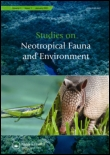
STUDIES ON NEOTROPICAL FAUNA AND ENVIRONMENT
Bridging Theory and Practice in Animal Science and EcologySTUDIES ON NEOTROPICAL FAUNA AND ENVIRONMENT is a distinguished academic journal published by Taylor & Francis Ltd, dedicated to advancing the fields of Animal Science, Zoology, and Ecology. With an ISSN of 0165-0521 and an E-ISSN of 1744-5140, this journal has been a significant outlet for scholarly research since its inception in 1976, continuing to provide critical insights into neotropical biodiversity and the environmental intricacies of this rich ecological region through 2024. Recognized in the Q3 category for both Animal Science and Ecology, the journal ranks at #232/490 in Animal Science and Zoology and #402/721 in Ecology, marking it as a valuable resource for researchers, professionals, and students interested in ecological and zoological studies. By offering a platform for innovative research and comprehensive reviews, the journal aims to bridge the gap between theory and practical application, facilitating a deeper understanding of the unique challenges and conservation strategies relevant to neotropical ecosystems. Although not an open-access journal, it plays a crucial role in fostering academic discourse and knowledge dissemination in its field, ensuring that critical advancements in understanding neotropical fauna and environmental dynamics reach a diverse and engaged audience.

REVUE SUISSE DE ZOOLOGIE
Championing High-Quality Research in ZoologyThe REVUE SUISSE DE ZOOLOGIE, published by the esteemed MUSEUM HISTOIRE NATURELLE, is a premier journal dedicated to advancing the field of zoology and its related disciplines. Established in 1964, this Swiss journal has consistently provided a platform for high-quality research in the areas of ecology, evolution, behavior, and systematics, currently holding a commendable Q3 ranking in these categories for 2023. With a rich publication history spanning from 1964 to 1979 and then from 1994 to the present, it serves not only as a significant repository of knowledge but also as a crucial resource for researchers, professionals, and students alike. While the journal is not open access, it remains a vital tool for those wishing to stay at the forefront of zoological research and innovation. Its commitment to disseminating groundbreaking studies makes it an indispensable asset for academic institutions and researchers globally, ensuring that pivotal findings in zoology continue to gain visibility and impact.
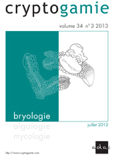
CRYPTOGAMIE BRYOLOGIE
Elevating the Study of Mosses and Their EcosystemsCRYPTOGAMIE BRYOLOGIE is a prominent academic journal published by ADAC-CRYPTOGAMIE, focusing on the intricate field of bryology—the study of mosses and other bryophytes. Established in 1999 and continuing its commitment to scholarly excellence through to 2024, this journal serves as a vital platform for researchers, professionals, and students invested in ecosystem dynamics, plant sciences, and evolutionary biology. Recognized for its rigorous peer-review process and notable contributions, CRYPTOGAMIE BRYOLOGIE holds esteemed rankings, with a Q3 categorization in Ecology, Evolution, Behavior and Systematics and Q2 in Plant Science as of 2023. While the journal operates without open access, its articles are essential for advancing knowledge and fostering discussion in the disciplines it serves. Given its strategic position within the Scopus Ranks, where it occupies significant rankings in the domains of Plant Science and Ecology, the journal is poised to influence ongoing research and inspire future studies in the rapidly evolving world of bryophytes.
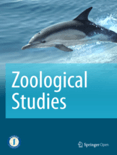
ZOOLOGICAL STUDIES
Illuminating the wonders of the animal kingdom.Zoological Studies, published by the Biodiversity Research Center, Academia Sinica, stands as a pivotal journal in the fields of animal science and zoology. With the ISSN 1021-5506 and E-ISSN 1810-522X, this Taiwanese journal features a blend of pioneering research that spans over three decades, from 1994 to 2024, fostering a deep understanding of biodiversity and zoological phenomena. Recognized for its scholarly contributions, Zoological Studies holds an esteemed Q2 ranking in Animal Science and Zoology for 2023, positioning it among the top-tier journals in its category with a Scopus rank of #164 out of 490—reflecting its strong impact and outreach. While currently not open access, the journal aims to disseminate essential findings and discussions that advance ecological knowledge and inspire future research endeavors. Researchers, professionals, and students alike will find this journal an invaluable resource for accessing critical studies that drive innovation and conservation efforts in the field of zoology.

Check List
Fostering collaboration in animal and plant sciences.Check List is a distinguished open-access journal published by PENSOFT PUBLISHERS, dedicated to advancing the fields of Animal Science, Zoology, Ecology, and Plant Science. Since its inception in 2006, the journal has provided a platform for the dissemination of significant research findings, fostering global collaboration among scientists and researchers. The journal’s impact is evident, securing a Q3 ranking in multiple environmental and biological science categories for 2023, thereby affirming its role in enriching scientific literature in these domains. With a converged publication span from 2010 to 2024, Check List maintains a commitment to accessibility and transparency in research, making important contributions to knowledge in ecology and biodiversity. By reaching a diverse readership including professionals, researchers, and students, Check List exemplifies a vibrant forum for academic discourse. The journal's base in Brazil positions it uniquely to highlight regional research while embracing a broader international perspective.

RAFFLES BULLETIN OF ZOOLOGY
Pioneering Research for Global Wildlife ManagementRaffles Bulletin of Zoology, published by the National University of Singapore's Lee Kong Chian Natural History Museum, serves as a prestigious platform for the dissemination of cutting-edge research in Animal Science and Zoology, as well as Ecology, Evolution, Behavior and Systematics. With a current impact factor reflective of its Q2 category in both fields, this journal not only enhances its visibility in the academic community but also provides valuable insights into the complexities of biodiversity and conservation efforts. Covering a wide array of topics, Raffles Bulletin facilitates interdisciplinary collaboration and serves as an essential resource for researchers, professionals, and students alike. It is indexed in Scopus, ranking #233 out of 490 in Animal Science and Zoology and #406 out of 721 in Ecology, ensuring that the research published contributes significantly to the global discourse on wildlife and ecosystem management. Since its inception in 1996, this journal has bridged gaps in knowledge and continues to foster a deeper understanding of the living world.
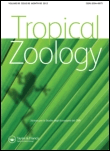
TROPICAL ZOOLOGY
Connecting researchers to the heart of tropical ecology.TROPICAL ZOOLOGY is a prestigious academic journal dedicated to advancing knowledge and research in the fields of animal science, zoology, and ecology. Published by PAGEPRESS PUBL, this journal has been an integral part of the scientific community since its inception in 1988, providing a platform for the dissemination of innovative research and discoveries related to tropical wildlife and ecosystems. With an impact factor placing it in the Q3 category for both Animal Science and Zoology, as well as Ecology, Evolution, Behavior, and Systematics, it ranks among the noteworthy publications in these fields. Researchers, professionals, and students will find that TROPICAL ZOOLOGY is an essential resource for the latest findings, fostering a deeper understanding of biodiversity and conservation in tropical environments. The journal is based in the United Kingdom, with additional administrative support from MEDIGROUP in Italy, ensuring a broad international perspective and reach. While it does not operate under an open access model, it remains committed to high-quality peer-reviewed content that contributes significantly to the understanding of tropical ecosystems and the species that inhabit them.
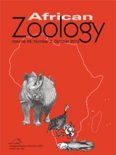
AFRICAN ZOOLOGY
Unveiling the Wonders of African WildlifeAFRICAN ZOOLOGY, published by Taylor & Francis Ltd, stands as a significant journal in the realm of Animal Science and Zoology, with a proud history dating back to 1996 and slated to continue until 2024. With an ISSN of 1562-7020 and E-ISSN 2224-073X, this journal provides a reputable platform for researchers and practitioners dedicated to the study of animal biology across the African continent. It has been recognized for its quality scholarship, evidenced by its Q3 categorization in the 2023 Scopus quartile rankings and an impressive rank of #182 out of 490 within its field. As an open-access journal, it facilitates the dissemination of vital research findings and promotes broader accessibility, catering to a diverse audience of professionals, scholars, and students alike. The journal aims to enhance our understanding of wildlife, conservation, and ecosystem dynamics in Africa, fostering collaborations that address critical ecological challenges. For researchers and enthusiasts keen on contributing to and staying informed about advancements in zoological science, AFRICAN ZOOLOGY is an essential resource that enriches the global discourse on biodiversity and conservation efforts.

CONTRIBUTIONS TO ZOOLOGY
Discovering New Horizons in Animal EcologyCONTRIBUTIONS TO ZOOLOGY, published by BRILL, is a premier scholarly journal dedicated to advancing the field of zoological sciences. With an ISSN of 1383-4517 and an E-ISSN of 1875-9866, this journal serves as a vital platform for researchers, professionals, and students seeking to share their findings and insights related to animal science, ecology, evolution, and systematics. Recognized for its high academic standards, it ranks in the top quartile (Q1) for Animal Science and Zoology, and Q2 for Ecology, Evolution, Behavior, and Systematics, reflecting its significance and influence in the scholarly community. The journal has been consistently published since 1994 and continues to contribute pivotal knowledge that informs and shapes contemporary zoological research. Researchers can access the journal through traditional subscription models, ensuring broad dissemination of its impactful articles and studies. Contributions to Zoology plays an essential role in fostering collaboration and discussion within the zoological community in the Netherlands and beyond.
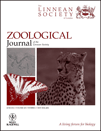
ZOOLOGICAL JOURNAL OF THE LINNEAN SOCIETY
Championing scholarly excellence in zoological studies.Zoological Journal of the Linnean Society, published by Oxford University Press, stands as a prestigious vessel for scholarly discourse in the fields of Animal Science and Ecology. With an ISSN of 0024-4082 and E-ISSN 1096-3642, this journal has an illustrious history dating back to its inception in 1866, and has consistently contributed groundbreaking research that shapes our understanding of zoology and evolutionary biology. Operating out of the United Kingdom, the journal boasts an impressive Q1 ranking in both Animal Science and Zoology and Ecology, Evolution, Behavior and Systematics, positioning it among the top tier of its category. With a significant presence in the academic landscape, the journal ranks 24th among 490 in Animal Science and 97th among 721 in Ecology, reflecting its impact and relevance in the field. Although it is not an open access journal, the wealth of knowledge it offers is invaluable for researchers, professionals, and students alike, aiding in the advancement of zoological sciences.